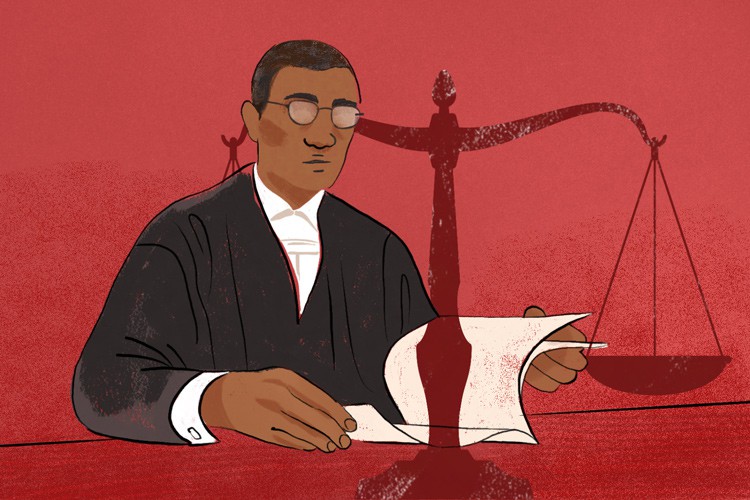Are judges crossing the line when they speak out?
Some are perilously close to breaking the Code of Judicial Conduct
Some judges have been speaking out on controversial issues. Are they breaching the Code of Judicial Conduct? Illustration: Lisa Nelson
The role of judges in South African public life seems to be growing ever bigger, but not always to their benefit. Judges traditionally used to speak only through their judgments, but no longer: even in pending cases we have heard judges speaking out.
The National Arts Festival in Makhanda hosted a Marikana and the Law discussion, with a keynote address by Constitutional Court Justice Mbuyiseni Madlanga. Justice Madlanga was one of the evidence leaders in the Farlam Commission of Inquiry and spoke passionately of the day of the massacre. He also gave the audience context on what happened in the days preceding it. He spoke of the role of the law, and the enormous task of leading the evidence team to uncover the truth.
His speech gave great comfort to many of the families of the dead miners seated in the venue.
But was this appropriate?
Some may note that he is a sitting judge, publicly commenting on an incident which is the subject of pending cases before the courts, cases that might go to the apex court where he sits.
The Code of Judicial Conduct at Article 11(f) states that “a judge must not, save in the discharge of judicial office, comment publicly on merits of any pending case before, or determined by, that judge or any other court”.
Madlanga certainly didn’t express himself on the merits of the matters still before the courts. He may well feel that, given he would have to recuse himself anyway, some limited comment on the outcomes of the Commission would be acceptable. But in our view, it is perilously close to the line laid down in the code.
This more open approach to public comment on issues of the day was certainly given a boost by the former Chief Justice Mogoeng Mogoeng, who regularly made speeches at events. He was however sanctioned by the Judicial Conduct Committee for comments on South Africa’s foreign policy on Israel, which he had to apologise for. This sanction for commenting on foreign policy was a timely reminder on the unique place judges hold in society. Judge Mojapelo, writing for the Judicial Conduct Committee, minced no words in his ruling, emphasising the importance of judicial restraint.
Chief Justice Zondo has followed in the footsteps of his predecessor by addressing the media from time to time, for example when he publicly called out Minister Lindiwe Sisulu’s intemperate attack on black judges. This was certainly a necessary step in these times of spurious and politically motivated attacks on the judiciary. But the Chief Justice went further than defending his fellow judges when he casually commented on the developments of the Gupta brothers’ extradition on live television. Zondo’s comments also come close to violating article 11(f), as some of the Gupta-related cases are before the courts.
As citizens, judges must be expected to participate in public discourse because societal issues affect them too. They are not protected by an invisible cloak from absorbing the shocks experienced by all individuals in society. They too have the right to freedom of speech.
But the Code reminds judges of the particularly difficult balance judges need to strike between their personal freedoms and the restraints judicial office imposes on them. This balance is particularly strenuous in the currently febrile political climate we are in.
For several years Judge Dennis Davis has hosted Judge for Yourself, a television show “tackling thorny issues that undermine South Africa’s human rights and threaten our country’s Constitution”. Some might say that places him squarely in conflict with the restraint demanded by the Code.
We do not think so. In the episodes we have seen, it seems that the show’s producers were careful to avoid issues that might relate to pending court cases. It seems to us the overriding purpose of the show is educational, and arguably necessary for public discourse on the law and society. We think this is an important role for judges to play.
By the same token, Madlanga’s presentation at a university auditorium for the educational benefit of the victims of a gross human rights violation like the Marikana massacre is an important role for a judge to play.
While we do not argue for judges to lock themselves away from public debate on social issues, we do call for thoughtful restraint from judges. More so in the current political climate, with increasing political attacks against the judiciary.
The Constitution requires state organs to act to protect the integrity and effectiveness of the judiciary. The Code requires judges to similarly avoid any conduct that might undermine the reputation and integrity of the judiciary. For their sake and that of the judiciary, we would encourage judges to heed these requirements at any point they feel it necessary to comment publicly.
Views expressed are not necessarily GroundUp’s.
Support independent journalism
Donate using Payfast

Don't miss out on the latest news
We respect your privacy, and promise we won't spam you.
© 2022 GroundUp. This article is licensed under a Creative Commons Attribution-NoDerivatives 4.0 International License.
You may republish this article, so long as you credit the authors and GroundUp, and do not change the text. Please include a link back to the original article.
We put an invisible pixel in the article so that we can count traffic to republishers. All analytics tools are solely on our servers. We do not give our logs to any third party. Logs are deleted after two weeks. We do not use any IP address identifying information except to count regional traffic. We are solely interested in counting hits, not tracking users. If you republish, please do not delete the invisible pixel.

